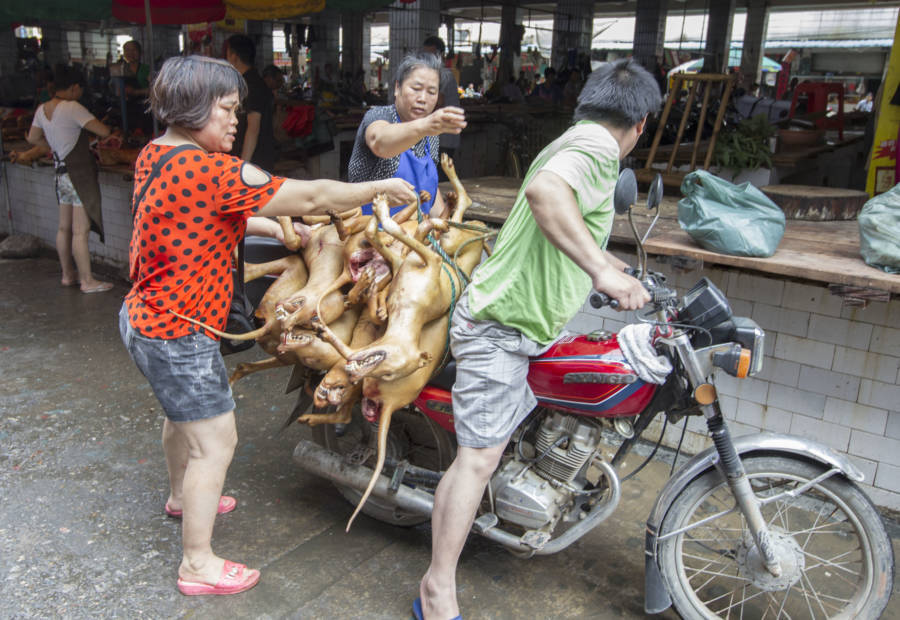Traditional Dietary Practices
Dog meat has long been consumed as part of traditional cuisines in certain regions of China. In northeastern China, where dog meat restaurants and farms are common, it has been a regular part of the Korean Chinese diet for generations. The practice of raising and slaughtering dogs for consumption is no different than how other livestock such as chickens, pigs, and sheep are reared. Dog soup is even considered an essential ingredient in some authentic Korean cold noodle dishes according to cultural food traditions. Similarly, in southwestern China’s Guangxi province, dog meat was incorporated into local cuisine as a commonly consumed meat for hundreds of years with no special significance attached. Residents would traditionally eat dog meat during the midsummer season believing it beneficial for health, just as lamb is eaten nationwide during winter months.

Controversy and Commercialization
In recent decades, growing awareness and concern from animal welfare advocates both within China and abroad have brought the practice under increased scrutiny. Passionate dog lover activists have vocally opposed the consumption and transport of dog meat. Some demonstrations against the trade have reportedly turned violent. Meanwhile, a rise in Western influence and the trend of keeping dogs as pets rather than livestock has changed attitudes especially among younger urban Chinese generations. Against this backdrop, an annual dog meat festival held in Yulin municipality gained widespread attention, criticism, and commercial promotion. However, advocates argue the festival was not a traditional part of local culture and only emerged as a publicity stunt following foreign outrage. Proponents maintain dog eating remains an established aspect of certain regional foodways deserving respect as with any traditional practice.
Complex Sociocultural Dynamics
The dog meat issue taps into complex sociocultural dynamics playing out as Chinese society modernizes and globalizes. Different perspectives derive from diverse lived experiences. For urban pet owners, dogs represent beloved companions, but rural communities maintaining age-old food traditions view them primarily as a source of protein. Younger Chinese today commonly see pets through a Western lens after being exposed to their influence. However, older generations and those inhabiting less developed areas continue viewing dogs through a lens shaped by regional foodways rather than emotional attachment. Food practices alone do not define one’s character or humanity on either side of this debate. Considering multiple viewpoints with empathy, nuance, and cultural sensitivity is key to progressing the discussion.
Evolving Regulations and Shifting Norms
As public opinion evolves, the Chinese government has taken steps to regulate the dog meat trade. A revised Animal Epidemic Prevention Law in 2021 prohibits the killing, selling, or transporting of pets like dogs and cats for consumption. However, enforcement remains challenging due to cultural complexities. Complete prohibition may not be appropriate or feasible nationwide given established culinary traditions in certain communities. A balanced approach preserving both animal welfare and cultural heritage could involve regulating slaughter methods, banning the dog meat festival and other commercial spectacles, public education promoting alternative proteins and lifestyle changes, and allowing consumption as part of respectfully fading traditions rather than abruptly ending them. As urbanization proceeds and younger generations adopt new norms, perspectives will likely continue shifting organically over time.
Looking to the Future
Whether dog meat consumption persists even in a limited form or gradually disappears altogether remains to be seen. Each new generation born after the practice has faded from their communities is less likely to resume the tradition. In northeast China, dog farms and restaurants still operate publicly as a tolerated cultural holdover. However, younger urban Northeasterners have largely embraced pets rather than raising dogs as livestock. Guangxi municipalities now ban dog slaughter festivals altogether while quietly allowing traditional household consumption. This balanced compromise respects both cultural preservation and ethical modernization. How foodways and relationships with animals evolve is an ongoing process impacted by many interwoven socioeconomic factors. With open and thoughtful discussion, reasonable compromises can be found that move all sides closer to mutual understanding if not full agreement on this nuanced issue.
Beyond Controversy
Overall, viewing this topic through a solely confrontational or accusatory lens often does more harm than good. For communities attached to culinary heritage, an respectful, solutions-oriented dialogue focused on regulation and education regarding alternatives is preferable to condemnation that threatens cultural identity. For animal lovers, considering multiple lived experiences and recognizing progress made can foster greater cultural sensitivity and diplomatic progress. Looking beyond surface controversy to the deeper societal dynamics at play offers insight into finding balanced solutions over time. As perspectives continue evolving worldwide regarding relationships between humans, animals and food, maintaining an open and understanding mindset across differences serves all sides best in working through complex issues constructively rather than destructively.

 An Unforgettable Journey to Rio de Janeiro
An Unforgettable Journey to Rio de Janeiro